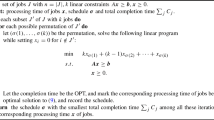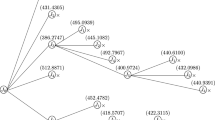Abstract
Earliest deadline first (EDF) scheduling algorithm is the most celebrated result for dynamic priority scheduling in real-time systems for both preemptive and non-preemptive cases. From complexity point of view, EDF is polynomial for preemptive scheduling of tasks; however, it becomes pseudo-polynomial under non-preemptive case. In this paper, we propose a technique that determines EDF feasibility of non-preemptive task set by analyzing schedulability of the lowest priority task at common scheduling points generated by all higher priority tasks in the task set. This adjustment results in improving the computational cost of an existing test from \(O(n^2 p_n/p_1)\) to \(O(p_n/p_1)\), where n is the number of tasks in the system, while \(p_n\) and \(p_1\) represent the task periods of largest and smallest periodic tasks respectively. With reduced computation cost, we understand that our technique has the potential to be intergraded with online systems for testing feasibility of a special class of real-time systems under non-preemptive case.

Similar content being viewed by others
References
Liu JWS (2000) Real time systems. Prentice Hall, Upper Saddle River
Krishna CM, Shin KG (1997) Real-time systems. McGrawHill, Pennsylvania
Buttazzo G (2005) Rate monotonic vs. EDF: judgment day. Real Time Syst 29(1):5–26
George L, Riverre N, Spuri M (1996) Preemptive and non-preemptive real-time uniprocessor scheduling. Research Report 2966, INRIA, France
Sha L, Abdelzaher T, Erzen K, Cervin A, Baker T, Burns A, Buttazzo G, Caccamo M, Lehoczky J, Mok AK (2004) Real-time scheduling theory: a historical perspective. Real Time Syst 28(2):101–155
Davis RI, Burns A (2011) A survey of hard real-time scheduling for multiprocessor systems. ACM Comput Surveys 43(4):1–44
Burns A, Davis RI, Wang P, Zhang F (2012) Partitioned EDF scheduling for multiprocessors using a C = D scheme, 18th RTNS, pp 169–178, 2010. An extended journal version of this paper (with the same title) is available from the Real-Time Systems Journal, 48(1):3-33
Min-Allah N, Khan SU, Ghani N, Li J, Wang L, Bouvry P (2012) A comparative study of rate monotonic schedulability tests. J Supercomput 59(3):1419–1430
Audsley NC, Burns A, Davis RI, Tindell KW, Wellings AJ (1995) Real-time system scheduling. ESPRIT basic research series. In: Randell B, Laprie J-C, Kopetz H, Littlewood B (eds) Predictably dependable computing systems. Springer, Berlin, pp 41–52
Min-Allah N, Jiansheng X, Yongji W (2010) Utilization bound for periodic task set with composite-deadline. J Comput Electr Eng 36(6):1101–1109
Min-Allah N, Hussain H, Khan SU, Zomaya AY (2012) Power efficient rate monotonic scheduling for multi-core systems. J Parallel Distrib Comput 72(1):48–57
Min-Allah N, Khan SU, Yongji W (2010) Optimal task execution times for periodic tasks using nonlinear constrained optimization. J Supercomput 59(3):1120–1138
Baruah S, Funk S, Goossens J (2003) Robustness results concerning EDF scheduling upon uniform multiprocessors. IEEE Trans Comput 52(9):1185–1195
Bini E, Buttazzo GC (2009) The space of EDF deadlines: the exact region and a convex approximation. Real Time Syst 41(1):27–51
Jeffay K, Stanat DF, Martel CU (1991) On non-preemptive scheduling of periodic and sporadic tasks. In: Proceedings of the real-time systems symposium, pp 129–139
Jejurikar R, Gupta R (2005) Energy aware non-preemptive scheduling for hard real-time systems. In: Proceedings of 17th of Euromicro conference on real-time systems, pp 21–30
Guan N, Qingxu D, Zonghua G, Wenyao X, Ge Y (2008) Schedulability analysis of preemptive and non-preemptive EDF on partial runtime-reconfigurable FPGAs. ACM Trans Des Autom Electron Syst 13(4):1–43
Nasri M, Gerhard F (2015) Open problems on non-preemptive scheduling of mixed-criticality real-time systems. In: International real-time scheduling open problems seminar (RTSOPS’15), pp 17–18
Sangwon K, Joonwon L, Jinsoo K (2006) Runtime feasibility check for non-preemptive real-time periodic tasks. Inf Process Lett 97(3):83–87
Liu CL, Layland JW (1973) Scheduling algorithms for multiprogramming in a hard real-time environment. J ACM 20(1):40–61
Baruah SK, Chakraborty S (2006) Schedulability analysis of non-preemptive recurring real-time tasks. Parallel and distributed processing symposium, 0:149, IPDPS 2006. doi:10.1109/IPDPS.2006.1639406
uC/OS (2016). https://www.micrium.com/rtos/
FreeRTOS (2016). http://www.freertos.org/
Wilson AG, Nickisch H (2016) Kernel interpolation for scalable structured Gaussian processes (KISS-GP). Carnegie Mellon University
Thekkilakattil A, Baruah S, Dobrin R, Punnekkat S (2014) The global limited preemptive earliest deadline first feasibility of sporadic real-time tasks. Real-time systems (ECRTS), 26th Euromicro, pp 301–310
Nasri M, Kargahi M (2014) Precautious-RM: a predictable non-preemptive scheduling algorithm for harmonic tasks. Real Time Syst 50(4):548–584
Swaminathan V, Chakrabarty K (2005) Pruning-based, energy-optimal, deterministic I/O device scheduling for hard real-time systems. ACM Trans Embedded Comput Syst 4(1):141–167
Author information
Authors and Affiliations
Corresponding author
Rights and permissions
About this article
Cite this article
Alrashed, S., Alhiyafi, J., Shafi, A. et al. An efficient schedulability condition for non-preemptive real-time systems at common scheduling points. J Supercomput 72, 4651–4661 (2016). https://doi.org/10.1007/s11227-016-1751-6
Published:
Issue Date:
DOI: https://doi.org/10.1007/s11227-016-1751-6




